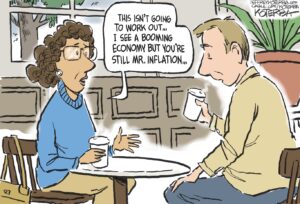VIDEO: U.S. Reaches Trans-Pacific Partnership Deal With 11 Other Countries
Almost a decade in the making, the controversial Trans-Pacific Partnership deal -- the largest regional trade accord in history -- was agreed to Monday by the United States and 11 other Pacific Rim nations.Almost 10 years in the making, the largest regional trade accord in history was agreed to Monday by the United States and 11 other Pacific Rim nations. The controversial Trans-Pacific Partnership (TPP) represents “a potentially precedent-setting model for global commerce and worker standards that would tie together 40 percent of the world’s economy, from Canada and Chile to Japan and Australia,” according to The New York Times.
In this NYT video, U.S. Trade Representative Michael Froman declares, “We, the trade ministers … are pleased to announce that we have successfully concluded the Trans-Pacific Partnership negotiation.”
Froman says that what he calls the “historic” TPP agreement will “support jobs, drive sustainable growth, foster inclusive development and promote innovation across the Asia-Pacific region,” while also raising living standards.
The New York Times reports:
The Trans-Pacific Partnership still faces months of debate in Congress and will inject a new flash point into both parties’ presidential contests.
But the accord — a product of nearly eight years of negotiations, including five days of round-the-clock sessions here — is a potentially legacy-making achievement for President Obama, and the capstone for his foreign policy “pivot” toward closer relations with fast-growing eastern Asia, after years of American preoccupation with the Middle East and North Africa.
The Pacific accord would phase out thousands of import tariffs as well as other barriers to international trade. It also would establish uniform rules on corporations’ intellectual property, open the Internet even in communist Vietnam and crack down on wildlife trafficking and environmental abuses.
Its full 30-chapter text will not be available for perhaps a month, but labor unions, environmentalists and liberal activists are poised to argue that the agreement favors big business over workers and environmental protection. Donald Trump has repeatedly castigated the Pacific trade accord as “a bad deal,” injecting conservative populism into the debate and emboldening some congressional Republicans who fear for local interests like sugar and rice, and many conservatives who oppose Mr. Obama at every turn.
Long before an accord was reached, it was being condemned by both Mr. Trump, the Republican presidential front-runner, and Senator Bernie Sanders of Vermont, who is challenging Hillary Rodham Clinton for the Democrats’ nomination. Other candidates also have been critical. Mrs. Clinton, who as secretary of state promoted the trade talks, has expressed enough wariness as she has campaigned among unions and other audiences on the left that her support is now in doubt.
Read the full article here.
Click here to read Ralph Nader’s 10 reasons why the TPP is not a “progressive” trade agreement.
–Posted by Roisin Davis
Your support matters…Independent journalism is under threat and overshadowed by heavily funded mainstream media.
You can help level the playing field. Become a member.
Your tax-deductible contribution keeps us digging beneath the headlines to give you thought-provoking, investigative reporting and analysis that unearths what's really happening- without compromise.
Give today to support our courageous, independent journalists.






You need to be a supporter to comment.
There are currently no responses to this article.
Be the first to respond.